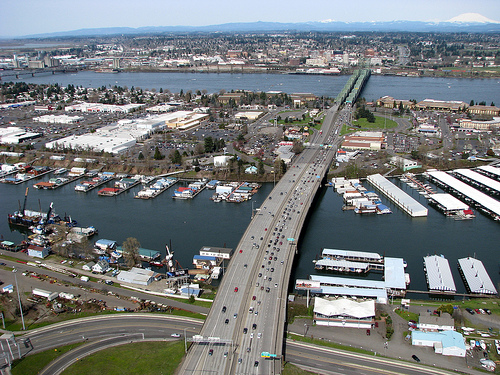And so it begins.
Faced with mounting costs and uncertain funding, the planners of the Columbia River Crossing are hoping to “save” money by postponing parts of the project. And unsurprisingly, biking and walking investments are among the first things on the chopping block. If you want the details, BikePortland has the goods.
Of course, it’s just a proposal at this point. But it’s a telling one. First, because of the doublespeak: as economist and CRC-watchdog Joe Cortright points out, the CRC planners claim that they’re simply delaying parts of the project by a few years, but they still want to count delayed spending as “savings.” That’s having it both ways: either the project is cheaper because it’s smaller, or it’s the same size and just as costly. Pretending otherwise is gobbledygook.
But second, the CRC planners’ move may signal the trajectory for many of the highway megaprojects under construction in the Northwest.
Road planners often toss popular side projects—street improvements, new bike lanes, walkways, and so forth—into multi-billion dollar highway packages. Many of these side projects were actually good ideas in their own right; but arguably, they were wrapped into megaprojects mostly to build political support.
But now that transportation agencies in both Oregon and Washington are facing some ugly budget realities—with tolling revenue harder to come by, and gas tax receipts below forecasts—they have virtually no choice but to trim their ambitions. And the side projects that were added for political reasons become the first to walk the plank.
The cynical side of me thinks trimming back on these sorts of side projects was always in the plan, or at least in the playbook. I’ve been told by WSDOT consultants that the agency prides itself on managing projects to fit the available budget, in part by altering the project’s scope or schedule to cut costs. And this puts the issue of “cost overruns” in a different perspective: perhaps “scope under-runs”—where car capacity gets built, but the multimodal projects get tossed to the roadside—are what we should be keeping our eyes on.


Comments are closed.